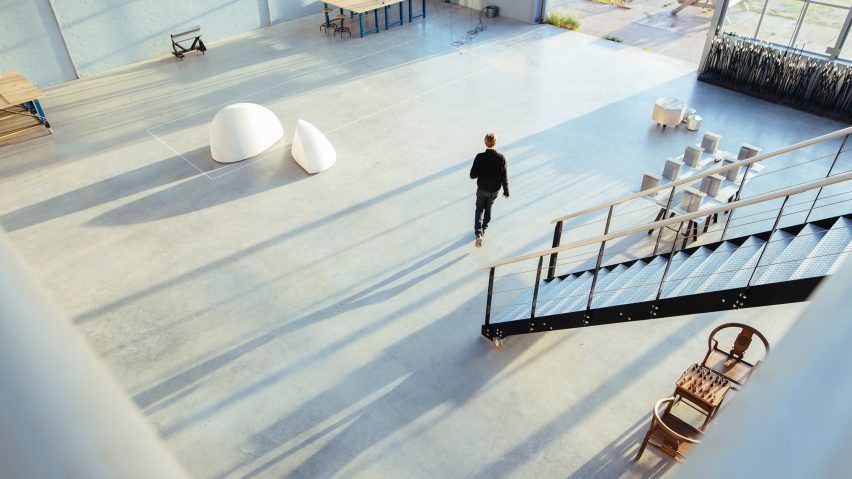Studio Roosegaarde has revealed its new Rotterdam office, the Dream Factory, which is located inside a 1930s glass factory overlooking the city's harbour.
The 1,000-square-metre structure was saved from demolition and overhauled by Studio Roosegaarde to create its new Dream Factory offices – the "dream lab of the 21st century".
Designers and engineers have offices on the upper floor, overlooking a large atrium used for building prototypes.
Adjacent grounds of 2,000 square metres are used for working on larger projects, including the studio' Smog Free Project, which aims to eradicate air pollution.
Studio Roosegaarde is one of several pioneering studios based in Rotterdam – a city that is establishing itself as a world-class destination for architectural innovation.
It is also home to OMA, MVRDV and Studio Makkink & Bey, as well as KAAN, which also recently moved into new offices.
"Rotterdam feels like a great place to experiment, and prototype the landscapes of the future," said Roosegaarde.
"It is a place where the city promotes creativity. From here we launch ideas into the world."
Glazed partitions divide the space, but also double as transparent drawing boards for jotting down ideas during brainstorming sessions.
The building also contains a "dream library" housing a collection of antique and contemporary books, a laboratory used to cultivate live bio organisms in the dark, and furniture inspired by boats.
"The building's main centre stage is malleable to its dream functions such as open lab sessions and educational activities," said the studio.
Offices on the top floor feature large windows facing out over the harbour and river.
The building forms part of Rotterdam's Innovation District, where neighbours include Atelier van Lieshout and Richard Hutten.
A number of warehouses in the district have also been converted into cafes, shops and business incubators.
Rotterdam has long been a testing ground for radical architecture, as so much of it was destroyed during the second world war. Examples including Piet Blom's Cube Houses, built in 1977, and Marcel Breuer's De Bijenkorf department store of 1957.
The city has also seen the arrival of several major buildings recently, including MVRDV's landmark market hall and OMA's towering De Rotterdam hotel.
Photography is by Willem de Kam and Daan Roosegaarde.

